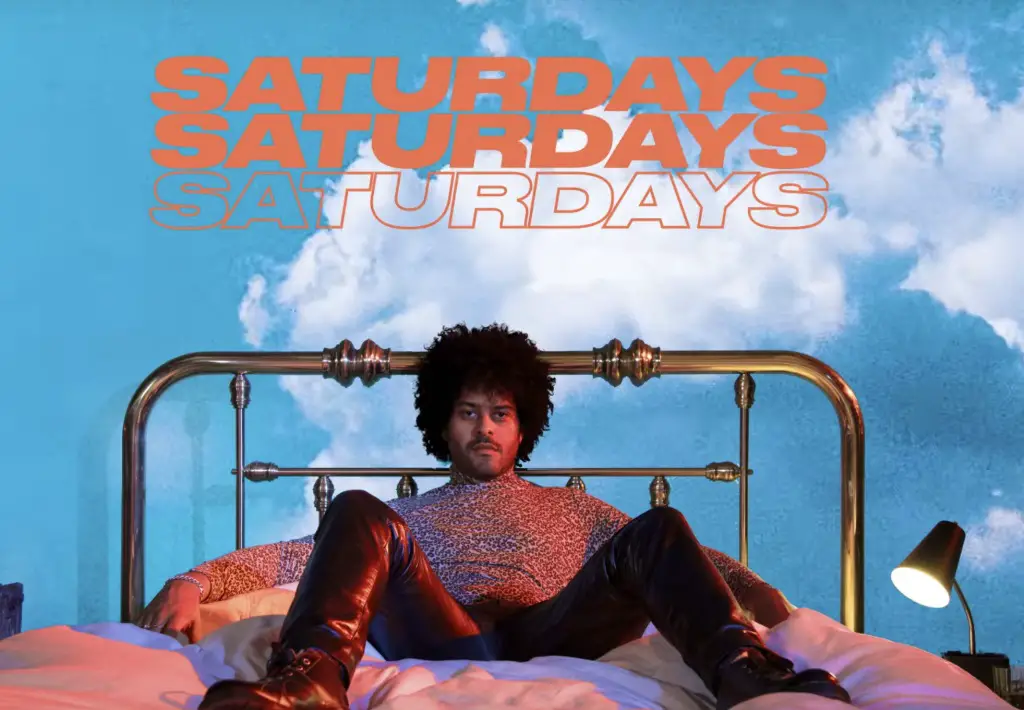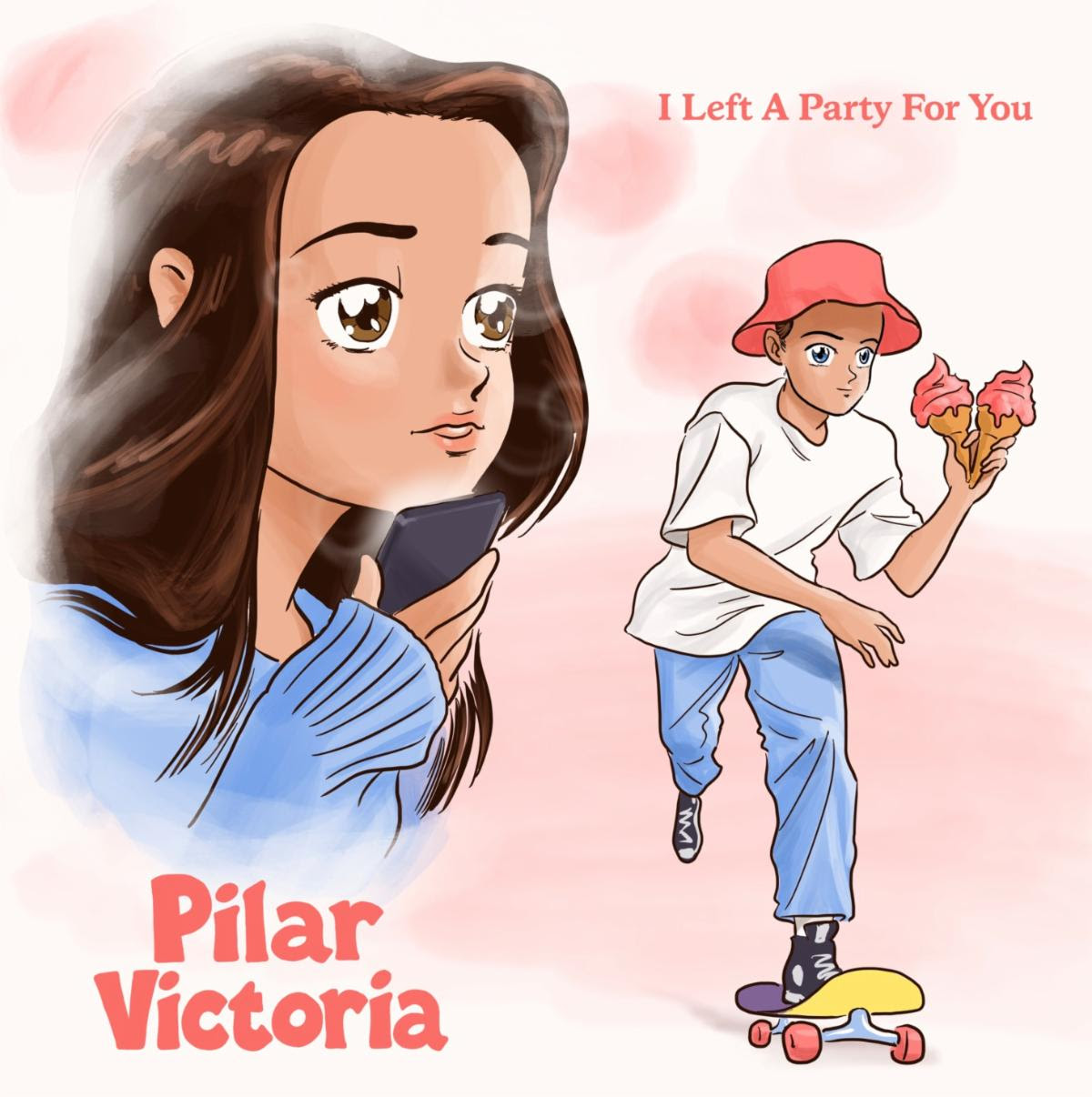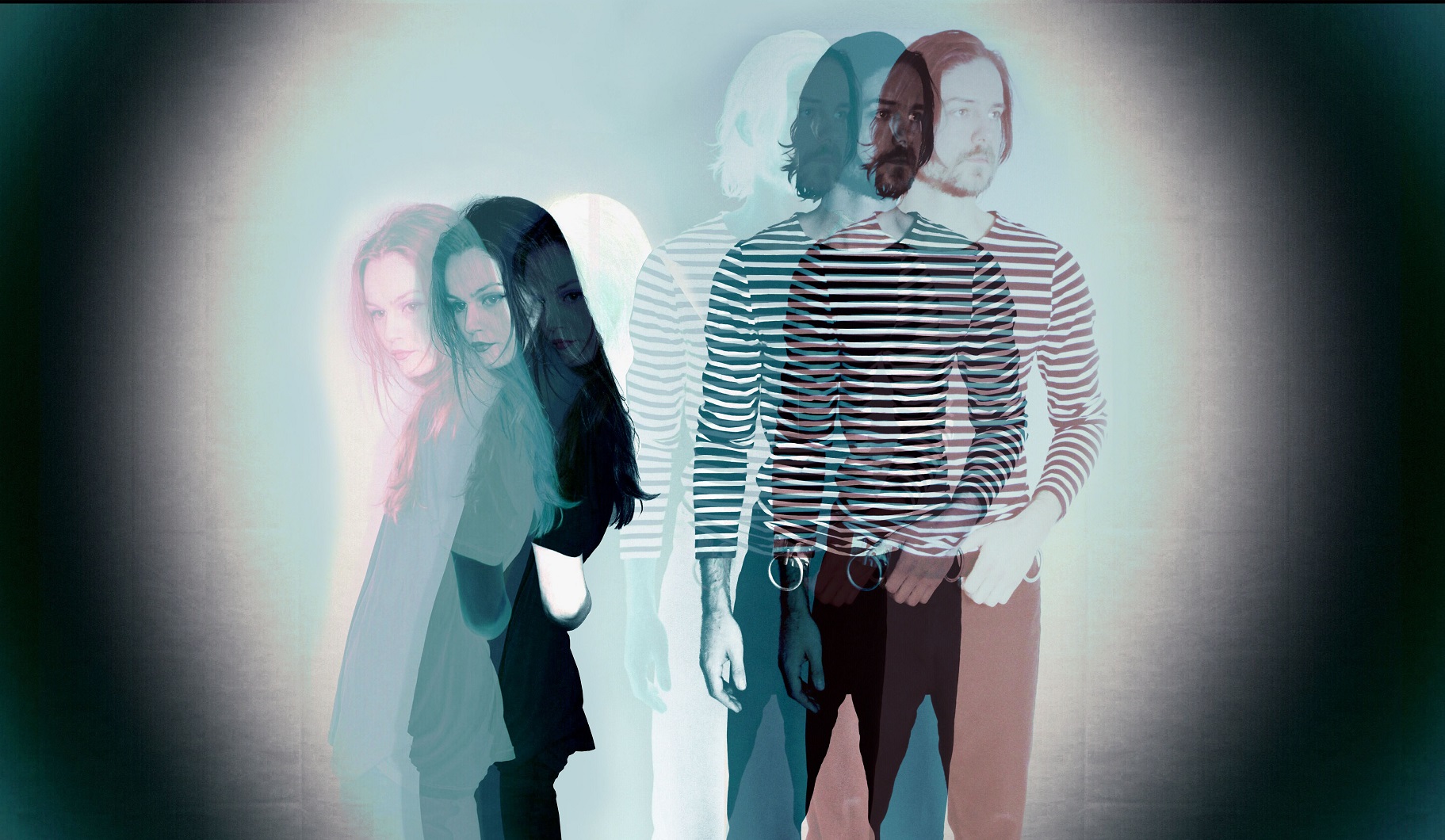Throughout the year, Atwood Magazine invites artists to participate in a series of essays reflecting on identity, music, culture, inclusion, and more.
•• •• •• ••
Today, Dylan Gamez Citron of LA-based band bedbug shares their essay, “Reaching Up to Heaven and Just Falling Short: A Bedroom Pop Retrospective” – reflecting on the rise and fall of bedroom pop, a genre that went from the weird, authentic, and wonderful to the commercialized and kitsch in the span of a decade.
Once a proud lo-fi / bedroom pop project themselves, bedbug have since expanded in size (to a five-piece band) and scope to become part of a self-proclaimed indie rock revival, and are set to release their fifth studio album, ‘pack your bags the sun is growing,’ on March 15 via Boston-based indie label Disposable America.
Stream: “halo on the interstate” – bedbug
•• ••
“A BEDROOM POP RETROSPECTIVE”

by bedbug
The 2010s was a pretty stupid decade for underground, independent rock-adjacent music.
It was a decade full of bands named after moms and dads and sports and dogs. Everyone was allergic to capital letters and a lot of people spent way too much time on the internet. Sloppy recording mistakes were forgiven in the constant warmth of tape hiss, and for most of my teenage years, it was the only music that felt genuine.
I wasn’t alone. To clarify, I wasn’t alone in feeling that way about bedroom pop. I was alone in a different sense. I felt lonely, even though I didn’t have much of a reason to be. I had hobbies, friends and a supportive family, etc. But I also lived in a town that offered little for a depressed, anxious, and very teenaged indie rock fan. Looking back I wasn’t much of an outcast, but that didn’t matter because in my head I was the freaks and the geeks from short-lived cult TV show “Freaks and Geeks” – all rolled into one. I spent a chunk of my senior year of high school driving around aimlessly. My soundtrack at the time reads like a collage of early bedroom pop influences.
Bedroom pop was mostly popularized through Tumblr and basement shows. I found it through the former. From where I sat, scrolling alone in my bedroom, the amalgamation of loosely-associated, mostly-online musicians felt like a real community. I wanted to be part of it. Or something like it. Finally, I had found an entire genre of music made by people who felt the exact kinds of stupid feelings that I felt.
I wanted to write the types of songs that made me feel a nostalgia so crushing, I could feel my heart in my own guts. Nostalgia for what? It didn’t matter. I was hooked. I would close my eyes and picture grimy living rooms, dimly lit with string lights, packed with people who felt exactly the kinds of stupid feelings that I felt. And for the next eight-ish years, I dedicated hundreds of hours to writing, listening and performing bedroom pop. All to make people feel the exact kinds of stupid feelings that I felt.
And now, finally, in 2024, it is dead. Well, it’s mostly dead. Anyone who’s met a fan of psych rock knows that genres never really die. But if there was a “golden age” of bedroom pop, it is now definitely over. If there was ever a “first wave” of bedroom pop, it has long since crashed ashore. So I figured, now seems as good a time as ever to reflect on the genre. If there was ever a genre for me to get sincerely nostalgic for, it’s bedroom pop. And if you are still reading this, you’re already indulging me.

Elephants in the room
Let’s address the elephant in the room: At some point in this retrospective, you will see a band mentioned that someone, somewhere has beef with. If I’ve learned a single thing from my years of participating in the online and local music scene, it is this: Everyone has beef with everyone. A lot of the time, it’s extremely warranted! Sometimes it’s not. This took me years to learn, and now I’m telling you for free. There is no way to avoid it, so don’t try. Due to my dedication to the craft of online music blog journalism, I will try to put my own particular vendettas aside for this piece.
Similarly, I can almost guarantee that you will see at least one band mentioned that you think is “cringe” or “embarrassing.” Sometimes right next to a band that you think is cool and not cringe at all. This is also unavoidable. Fortunately, I have a foolproof way to lessen that blow: Every single band within the proximity of lofi bedroom pop is cringe. All of them. This entire article is “cringe.” Hell, even most of the foundational artists have completely disassociated with the term “bedroom pop,” the scene, or both.
Another hurdle for any sort of genre retrospective is that it’s impossible to acknowledge every artist. That feels doubly true for bedroom pop. Ninety percent of the genre’s best releases are lost, deep in an ancient version of Bandcamp. They’re hidden behind cheesy genre tags like “cone” or “loser.” Maybe they were never even shared to social media. Maybe they were lost to a Myspace purge. Here’s an example. About five years ago, I picked up a record in the dollar bin based off of the cover. It was released by an artist called A Boy Named Thor in 1998. Since then, I’ve only been able to gather that it was released alongst similar records for a cassette club in the ’90s. It is also eerily similar to the bedroom music documented here.
In the end, I’m just a fan doing the best that I can. If you are thinking, “Why not just do a bit more research to cover the most important bases?” Easy. Because I already have a day job, and my day job is not music blogging. Plus, if this piece gets any longer, whoever publishes this is going to force me to turn it into a tweet thread.

The foundations
On September 11, 2001 (yes, you read that date correctly), the Microphones released The Glow, Pt. 2 to near-universal acclaim amongst critical reviewers, music forum dorks, and enjoyers of genuinely good shit. Daniel Johnston had long achieved cult status with a simple tape recorder and chord organ. Blogspot readership was at an all-time high, creating a wild-west of independent music fandom. The Radio Dept. had already released Lesser Matters, an indie pop masterpiece featuring prominent usage of Casio toy keyboards. Soon, the Mountain Goats would release All Hail West Texas, famously recorded on John Darnielle’s lo-fi boombox. Two years before the release of Hospice, The Antlers released a beautiful album named In the Attic of the Universe, inspired by The Glow, Pt. 2. The result is an album that sounds as if it could’ve been released nearly a decade later during the bedroom pop boom. It wasn’t particularly influential, but it rules.
We could also go back further, but you get the picture. Something was simmering in a decade typically characterized by grandiose indie anthems. Arcade Fire were in full throttle. Radiohead dethroned the Beatles as the Ultimate Band. Modest Mouse had just abandoned their unpolished, garage style in favor of creating nautical music for cartoon network shows. You could also discuss the prominence of Chillwave, Vaporwave, and other internet-culture genres that romanticized nostalgia. I won’t discuss them though, because unlike for the indie stuff, I wasn’t really there.
I’m not sure anyone knows who the first “real” bedroom pop artist was. I’m not entirely sure who even coined the term. What I can do is make an educated guess of the timeline. In my head, it goes like this: The 2000’s saw a lot of influences and precedents breaking through. Bands that pushed the bounds of home recording in the earlier years. The turn of the decade saw the true birth of the genre, around 2010. By 2015, the “golden age” of bedroom pop was in full swing, and by 2020 the genre had become almost entirely commercialized.
Who were the earliest pioneers? It depends on who you ask. As mentioned earlier, most have been lost to the ancient ruins of Myspace. Others were small-town basement bands that never recorded material. For me, I would give serious credit to Owen Ashworth of Advance Base and Casiotone for the Painfully Alone. Emperor X and Old Table as well. You could also include Frances Quinlan’s earliest work as Hop Along, Queen Ansleis. To me, these artists paint a solid picture of the future sound of the genre. That’s right, a dozen paragraphs in and it’s finally time to talk about sound. I will try my absolute best to avoid cliche music journalism flourish words like “lush” and “dreamy” in an attempt to be as clear as possible.
Bedroom pop is difficult to define. Like the term “indie,” it doesn’t actually signify anything stylistically. For better or worse, these were the unifying elements at its height.
- Bedroom pop is homemade. It’s cheap, in a “cool way.” This is where the “lo-fi” signifier comes in. It needs to sound like it was recorded in a bedroom! Audio hiss, pops and blemishes are embraced. Why spend money on fancy stuff when a USB microphone and Garageband can do the trick? In the early days, this was a necessity. Later, it became a stylistic choice.
- Acoustic guitars are often preferred over electric. Bedrooms are quiet places. Bedroom pop should sound like it was recorded at 4am while trying to avoid waking roommates/parents.
- Drum machines are often preferred over drum kits. Again, who is playing drums in their bedroom?
- Usage of cheap “toy” keyboards and hardware synths is common. This also began out of necessity, then shifted into a stylistic decision.
Ready for an example? Check out this song by Julia Brown. See how it incorporates each element? It’s more than just the sum of its parts. The parts themselves serve as a vehicle for the feeling. It’s nostalgic, it’s sincere, it’s a little sad, and it’s warm. Is this the intention of every bedroom pop song? Of course not. But I would argue that bedroom pop was able to effortlessly communicate those emotions in a way that other genres often struggled with. There’s just something about the tape hiss, sounds of loneliness and beauty.

The “golden age” of bedroom pop
“I’m not sure where I’d have first heard the term,” Sam Ray of Teen Suicide, Ricky Eat Acid, Julia Brown, and more explained to me. “It was more like a slow creep into the corners of my vision or whatever. I don’t identify with it, I never did, and I doubt I ever would… But I don’t fight against it either. It’s functionally true, to an extent – a lot of my music is recorded in bedroom type places… it’s like “Garage-rock” I suppose – a catch all.”
Ready for the dense section? Great. In 2010, Warren Hildebrand released Swung from the Branches on Bandcamp (which was a pretty new platform at the time) under the name Foxes in Fiction. Alongside the release of that record, Hildebrand formed the tape label Orchid Tapes, which would serve as a hub for the emergent genre.
They would go onto work with pioneering acts like Alex G, Spencer Radcliffe, Fog Lake, Rachel Levy, and Julia Brown between 2010 and 2015. If there’s a poster child for bedroom pop, someone who nearly every fan of the genre can agree on, it’s Alex G. His first album, Race, was released in 2010, and his breakthrough record DSU was released on Orchid Tapes in 2014.
Of the use of the term bedroom pop in this early era, Hildebrand would tell me that he “identified with it really strongly at the time because it seemed to encapsulate so much of the ethos of both the label I run and the music I was making at the time and could be similarly applied to a lot of the stuff my friends were making – literally solo musicians writing and recording pop songs in their bedroom.”
Despite never formally associating with the genre or associated scene, between 2010 and 2020, Sam Ray prolifically released some of the genre’s seminal works under a half-dozen artist names. In 2012 alone, Ray released dc snuff film, waste yrself, i will be my own hell because there is a devil inside my body, summer made me blue; summer gave me sky, you get sick; you regret things, and a split with Blithe Field. In 2013, he released to be close to you as Julia Brown, starry cat as starry cat, and a huge teen suicide b-side record. In 2014, he released Three Love Songs as Ricky Eat Acid. Ray referred to the genre signifier of bedroom pop as “functionally true, to an extent – a lot of my music is recorded in bedroom-type places.” Regardless, at different points in my own life, I’ve called each of these records “the best record I’ve ever heard.”
Other artists also had a massive footprint on the genre in the earlier years. In 2011, Will Toledo released Twin Fantasy under the name Car Seat Headrest, which became a cult hit and helped to popularize bandcamp as a platform. In 2012, a self-titled by Salvia Palth was quickly embraced by the internet. Daniel Johann, the person behind Salvia Palth, was only 15-years-old. Releases by Coma Cinema/Elvis Depressedly, Flatsound and Dandelion Hands gained immense popularity on social media around the same time. These early releases really solidified the style and themes of the genre.
Some bedroom pop scenes seemed to exist in their own isolated microcosm. While the genre flourished online, it also existed in pockets of local music scenes. Scattered across New York, acts like Bellows, Told Slant, Frankie Cosmos, Florist, Gabby’s World, Porches, and Quarterbacks all introduced new fans to the genre. For some scenes, the added spotlight exposed problems that threatened to break the illusion of community, but that’s all been covered thoroughly in other pieces. It is also not my business.
Between 2013 and 2015, the pace of releases quickened. In addition to more records from the artists above, I remember seeing first releases from Fog Lake, Bulldog Eyes, Infinity Crush, Adult Mom, Cyberbully Mom Club, Japanese Breakfast, Emily Yacina, and many, many more.
As a fan, these were the rose-colored years. I know they were not perfect, I’ve been involved in the music scene for long enough to know better (I’m not even on speaking terms anymore with a few artists mentioned in this piece). For more than a few prominent artists, the early years were stained by unhealthy relationships with drugs, abuse and sexual assault. But I had left for college in 2014, and it was my first time away from home. I was in a long-distance relationship that would continue to be long-distance for nine months. I lived in an engineering dorm that smelled like body spray and body odor, where slurs were more common terms of address than first names. I needed bedroom pop (or something like it).

A growing popularity
The internet is moving faster these days. Memes used to be hammered into the ground over the course of a few grueling years. Now, a meme is lucky to last over a week without becoming passe. Genres aren’t much different. Is anyone still making hyperpop? How about emo rap?
The point is, the timespan between 2010 and 2015 is long enough for someone to apply to college, get accepted, graduate, and still have a few months to spare. For me, it was long enough to discover bedroom pop in high school, teach myself guitar, and begin releasing my own bedroom pop in college. I’m not saying that everyone did this, but for an internet trend, those five years felt like a lifetime. For many teens, bedroom pop was their genre of choice for as long as they had been serious about listening to music.
Teens weren’t the only ones who caught wind of the genre’s appeal. Run for Cover Records and its affiliate label Joy Void began scooping up some of the most influential acts in the scene. In a few short years, they had worked on records with Teen Suicide/Julia Brown, Spencer Radcliffe/Blithe Field, Advance Base, Elvis Depressedly/Coma Cinema and Infinity Crush. They continued picking up emerging bedroom artists like Cat Be Damned/Erik Philips, Katie Dey, Field Medic, Mini Dresses and even bedbug.
Speaking of bedbug (because I clearly have no shame), there were other notable labels that catered to bedroom music. Many of these released one or two cassette runs before falling into obscurity. Others built a successful name for themselves, carefully curating releases. Arguably, the most influential of these labels was Z Tapes, the pet project of Slovakian music fan Filip Zemcik.
I may be biased here – my first record if i got smaller, grew wings and flew away for good was one of their first breakthrough releases. I think we got lucky – it coincided with a massive bandcamp daily article on Z Tapes. But it did seem like between 2015 and 2018, Z Tapes dominated bedroom pop. Z Tapes worked with Fox Academy, Laptop Funeral, In Love With A Ghost, Pickle Darling, Ghostbusters VHS, Orchid Mantis, American Pleasure Club, Max Gowan, Washboard Abs, If I Die In Mississippi, Pet Cemetery, Francie Cool/Florry, Brittle Brian, Moving In, Sea Ghost, and even bedbug. And that’s not all! At the time of writing this, Z Tapes has put out over 190 releases.
Over the next few years, the genre got bigger. Other new artists made their impacts on the scene like Sidney Gish, Skirts, Molly Drag, Beagles, Kitchen and Trace Mountains. Alex G signed to Domino in 2015 in an unprecedented turn for a bedroom musician. Michael Cera released a bedroom pop record (featuring a beautiful cover of Clay Pigeons by Blaze Foley). Controversial emo rapper XXXTentacion sampled no, the moon by Teen Suicide in 2016, which Sam Ray publicly disavowed. Frank Ocean played some Teen Suicide songs on his radio station, which Sam Ray publicly embraced. Today, flowers ft. nori by In Love With A Ghost has over 13 million plays on youtube. Soccer Mommy, who put out her first record on Orchid Tapes, opened for Bernie Sanders at a rally in 2020.

Spotify, Playlists, and The Death of Bedroom Pop
On February 6, 2020, NBC released an article “explaining” bedroom pop and DIY. The article mentions a scant few artists. One of the mentioned artists was Billie Eilish. The others might as well have also been Billie Eilish. They all certainly sound like Billie Eilish. If you go onto Spotify right now and search “bedroom pop,” it’s likely that not a single artist that has been mentioned in this piece will appear.
What comes up when you search for bedroom pop on Spotify? You get the esteemed Spotify “Bedroom Pop” playlist. Studio-produced, groovy alt-pop, curated for Instagram stories and vibes TikToks. I like to refer to this new wave as “white people making RnB for Spotify.” It’s not always bad, but it does muddy the search. If you want to know more about that side of bedroom pop, you’re welcome to click the link to that NBC article above.
YouTube isn’t much better. Tastemaker channels like David Dean Burkhart began pushing this newer style hard a few years back. For some, bedroom pop has only ever been synonymous with “retro pastiche.”
For Sam Ray, this seems to be a logical conclusion to a genre that has been eating its own tail for the last few years. “The worst but also most interesting thing,” he explained, “is watching a new, younger second wave of whatever of artists making music they’re calling ‘bedroom pop’ but intentionally, who seem inspired musically almost solely by the first ‘group’ or wave or whatever, doing basically pastiche versions, without any of the interesting, weird, “uncool” outside influences and all that.”
“Bedroom pop was a term retroactively applied to a disparate and mostly unconnected group of people/artists,” he continued, “who all happened to be making things with very little or no money required at the same time… in the same digital zone… To an outside observer then became further proof of a burgeoning scene or moment, or something. But then again, I was never really much a part of any of this, so maybe to me it feels a lot more cold and pointless than it did to someone who can look back on that time in their life fondly.”
For me, it’s hard not to sound bitter about the new, more commercialized developments. I know I am not the only one. “I definitely connect to it way less now,” Hildebrand shared with me, “since it’s gone the route of representing something pretty different than what it did originally. In a lot of ways it’s been co-opted by big budget musicians who use it to represent the style of the music they’re making and less so of the conditions that make a term like “bedroom pop” applicable…. So I don’t know, I don’t see much of a utility in it as a term anymore, like when people like Billie Eilish start being grouped in it kinda ceases to have any meaning.”
For most of my life, bedroom pop felt like music that only the most diligent and genuine music fans could stumble onto. It felt sincere. More importantly, it felt unpierceable by the talons of industry executives. Bedroom pop artists put out music for free on Bandcamp. Songs were badly recorded on purpose to maintain the feeling of intimacy. Bedroom pop was a genre committed to avoiding mainstream popularity by being as unpalatable as possible for anyone except the most determined listeners. That was the trade-off for the artistic vision. In many ways that’s what gave it soul.
What’s next for a genre that lost its soul? I don’t have the answer. A few weeks ago, I spoke to the owner of a once-thriving bedroom pop label. He told me he “would love to keep it going, but the artists have all moved on.” Maybe that’s the best we have for now. I’ll catch you all in a few years for the revival.
In memoriam: Bedroom pop (2010-2020). – Dylan Citron, bedbug
— —
:: connect with bedbug here ::
:: stream/purchase pack your bags… here ::
Stream: “postcard” – bedbug
— — — —

Connect to bedbug on
Bandcamp, Twitter, Instagram
Discover new music on Atwood Magazine
© courtesy of the artist
:: Stream bedbug ::


 © courtesy of the artist
© courtesy of the artist





